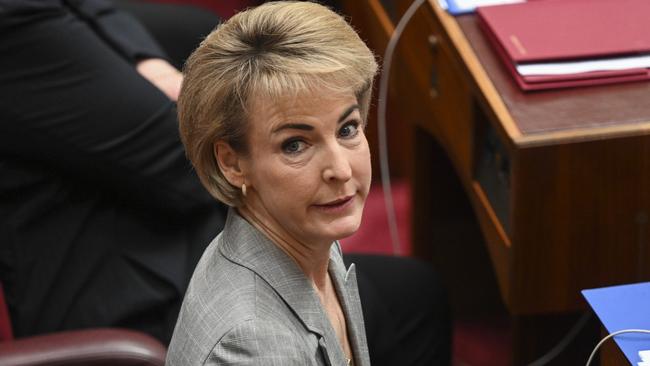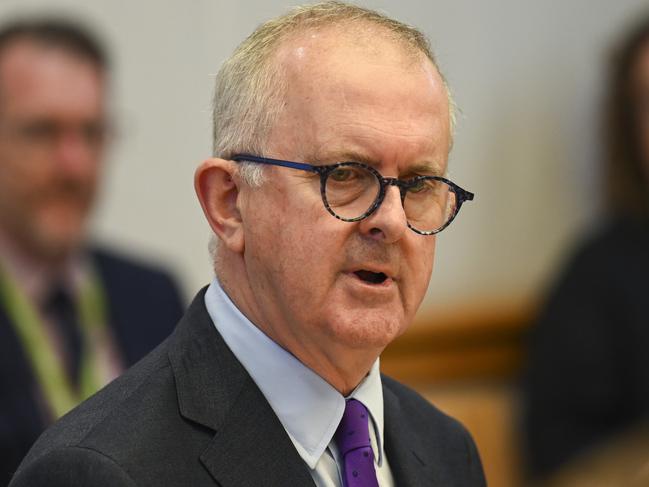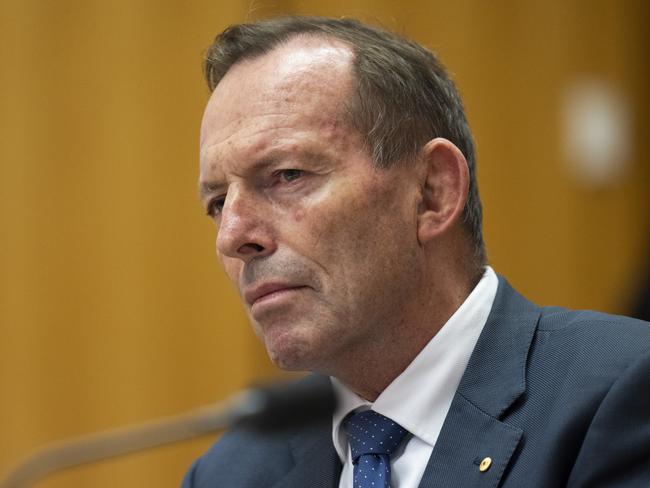Coalition send letter to AEC over’ fundamentally lopsided’ Voice call
Counting a tick as a “yes” vote but excluding a cross due to ambiguity about the voter’s intent risks “distorting” the national vote, the Coalition has declared in a stern warning to the Australian Electoral Commission.
National
Don't miss out on the headlines from National. Followed categories will be added to My News.
Counting a tick as a “yes” vote but excluding a cross due to ambiguity about the voter’s intent risks “distorting” the national vote, the Coalition has declared in a stern warning to the Australian Electoral Commission.
Opposition leader Peter Dutton and Coalition attorney general spokeswoman Michaelia Cash have written to the AEC Commissioner Tom Rogers urging the ruling about what counts as a valid vote in the referendum be reconsidered.
“We understand that the AEC’s current approach is broadly consistent with the approach that it has adopted in previous referendums,” the letter said.
“However, just because the AEC has adopted this approach before, does not mean that it is appropriate or legally correct.”
In the letter Mr Dutton warns not counting a cross as a “no” vote, while accepting a tick as a “yes” vote would be unfair.

“With the greatest of respect, this approach is fundamentally lopsided,” he said.
“We call on you to reconsider.
“If a tick counts for yes, a cross should count for no.
“To do otherwise gives the yes case an unfair advantage, and has the potential to undermine the impartiality and fairness of the referendum.”
But the AEC has fired back at the Coalition in a statement saying much of the commentary around the tick and cross issue was “factually incorrect”.
“The AEC completely and utterly rejects the suggestions by some that by transparently following the established, public and known legislative requirements we are undermining the impartiality and fairness of the referendum,” the statement said.
”As has been the case at every electoral event, the AEC remains totally focussed on electoral integrity. Indeed, electoral integrity is a central part of the AEC’s published values; underpinned by, and supported through, complete adherence to all relevant laws and regulations.”
Speaking on behalf of the AEC, Mr Rogers has pleaded with Australians to write in English either “yes” or “no” on the ballot paper.
But he has come under fire for highlighting “safety provisions” for when the voter’s intent on ballot is clear.

This includes of a “y” or “n” is written, but also that it would be “likely” a tick was accepted as a formal vote, but a cross would not be.
The cross and tick issue was raised during the 1999 referendum, with the former not accepted as a clear “no” vote.
AEC lashed over ‘unfair advantage’ in Voice ballot paper
A political storm is brewing around how yes and no votes for the Voice referendum will be counted after the Australian Electoral Commission revealed how the ballot process will play out.
The AEC has urged voters to write ‘yes’ or ‘no’ in English on ballot papers.
But speculation the yes camp will get an unfair advantage at the ballot box is rife after the AEC conceded a tick would count as a ‘yes’ vote but a cross would not count as a ‘no’ vote.
AEC Commissioner Tom Rogers confirmed on Sky News a cross would rule a vote invalid.
“Please make sure you write on that box yes or no in English, now there are some savings provisions,” Commissioner Rogers said on Sky News on Wednesday.

“But I need to be very clear with people, when we look that it is likely that a tick will be accepted as a formal vote of the yes but a cross will not be accepted as a formal vote.”
When asked by Sky News host Tom Connell if the system would give an unfair advantage to the yes camp, Commissioner Rogers said “no not at all”.
“They couldn’t be taken that way but that’s why we’re spending a lot of time talking to the community about what constitutes a valid vote,” he said.
“There will be very clear information on the ballot paper in the polling place, we’re spending a lot of time on that issue and what we’re trying to do is to make sure under the legislation that what the voters intend is clear that those votes are included.”

Former prime minister and avid ‘no’ supporter Tony Abbot said the AEC’s rules would create confusion and uncertainty.
“This is such an important issue and given that this is the biggest change in our constitution that we’ve ever been asked to make, there should surely be no confusion or uncertainty about what constitutes a valid vote,” he told Ben Fordham on 2GB.
“It’s going to be easier to get a yes vote than a no vote if a mere tick is going to count for a yes but you’ve got to specifically write no to vote no, and this is the worry.”
Opposition leader Peter Dutton said the move from the AEC is “completely outrageous.”
“I think it’s completely outrageous to be honest, if a tick counts for ‘yes’ then a cross should count for ‘no’, it’s as clear as that,” Dutton told Ray Hadley on 2GB on Thursday morning.

“Otherwise it gives a very strong advantage to the ‘yes’ case.
“But the Prime Minister from the start I think has tried to rig this thing by not providing the details.”
It’s widely anticipated Australians will head to the polls on October 14 to vote in the first referendum in 24 years.
Prime Minister Anthony Albanese is expected to announce the official date next week, triggering a six-week campaign sprint to voting day.
“Every Australian will have the opportunity to vote yes for a practical, positive difference in people’s lives,” Mr Albanese said.
“I will be campaigning for constitutional recognition, because if not now, when?”
The yes campaign has the tougher task of winning both a majority of the national vote, as well as at least four of the six states to successfully change the constitution.
Internal polling from both sides has placed Queensland in the no camp for some time, while a messy debate over now-scrapped Indigenous heritage laws in Western Australia is seen to have been the death knell for the Voice in that state.
Yes campaigners believe they are on track for a positive result in Victoria, NSW and Tasmania, though the latter island state is still in the sights of no campaigners.
This leaves South Australia as the ultimate battleground state of the referendum.
Sources have estimated the no campaign will spend some $10 to $12 million during the formal campaign with ads mostly targeting lineball states like South Australia and Tasmania, while the yes campaign is likely to splash up to $25m across the country as it seeks to secure both the national vote and individual states.
The Prime Minister said the referendum question was “very clear,” and would lead to recognition of First Nations people with a committee through which they could offer advice to government.
“The clauses which are there are legally sound, they will not interfere with the way that the government operates on a day-to-day basis,” he said.
“Our Parliament will still be in total control of its destiny.”
Once the date is confirmed all households will be mailed a pamphlet outlining the yes and no cases.
Similar to a general election, Australians will be able to apply for a postal vote, attend a pre-poll or a polling station on the day.
The ballot paper will ask voters to write either “yes” or “no” to the question asking if a Aboriginal and Torres Strait Islander Voice should be enshrined in the constitution.




